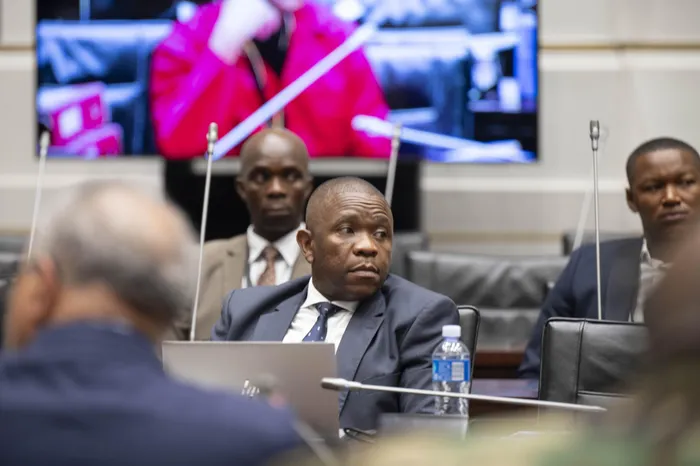
Mkhwanazi claims state security surveilled him and others for rejecting criminality in SAPS, exposing deep-rooted corruption, political purging, and misuse of intelligence structures during the Zuma administration.
Image: Armand Hough / Independent Newspapers
KZN Police Commissioner Lt-Gen. Nhlanhla Mkhwanazi has dropped a shocking testimony before Parliament’s ad hoc committee probing corruption within the SAPS, alleging he was sidelined and surveilled for refusing to engage in police criminality.
Speaking under oath on Wednesday, Mkhwanazi claimed that his departure from the position of Acting National Commissioner in 2012 was deliberate retaliation for his principled stance against corruption within the police hierarchy.
“I believe I was punished for being disciplined,” he told the committee, responding to a direct question from EFF leader Julius Malema.
Mkhwanazi, who served as Acting National Commissioner from October 2011 until June 2012, was appointed by then-President Jacob Zuma following the suspension of General Bheki Cele.
His term ended when Zuma appointed Riah Phiyega as the new permanent commissioner.
But, according to Mkhwanazi, what followed was a silent political purge.
“Maybe Phiyega must come here and explain why she did not allocate me a post for so long,” he said.
“Despite my experience, she appointed junior officers with less expertise while I was left at home, drawing a salary with no duties.”
Mkhwanazi alleged that not only was he frozen out of SAPS leadership structures, but that he, along with then Crime Intelligence Head Lt-Gen.Dumisani Khumalo and current National Commissioner, General Fannie Masemola, were subjected to 24/7 surveillance by state security and counterintelligence units.
“We were not just sitting at home, we were being monitored. State apparatus was weaponised against us,” he said.
The commissioner also aimed Phiyega's deployment of individuals he described as unqualified for key roles, citing a “non-trained police officer” who was appointed to lead training and previously served as head of Crime Intelligence.
Mkhwanazi's claims add weight to longstanding allegations that SAPS leadership was captured to shield internal criminal networks, particularly within the Crime Intelligence Division.
During his recent testimony before the Madlanga Commission, Mkhwanazi confirmed that he had raised red flags about "serious wrongdoing" directly with President Zuma during his time as acting commissioner.
“I went to him. I raised my concerns. His response was simply: ‘Just give me time. I’m going to appoint someone else,’” Mkhwanazi recalled.
“He chose to ignore my warnings and allowed the lawlessness to continue.”
While officially his acting role ended with the appointment of a permanent commissioner, Mkhwanazi’s testimony suggests the conclusion of his tenure was not a routine transition but rather a calculated ousting.
At the time, media reports hinted at political interference, citing tensions between Mkhwanazi and then and late-Police Minister Nathi Mthethwa, as well as disgraced Crime Intelligence boss Richard Mdluli.
The allegations put the spotlight back on the deeply entrenched corruption that plagued SAPS during the Zuma era and raise serious questions about the misuse of state security resources to target whistleblowers rather than criminals.
The committee session continues on Thursday, with Masemola on the stand.
kamogelo.moichela@iol.co.za
IOL Politics
Related Topics: